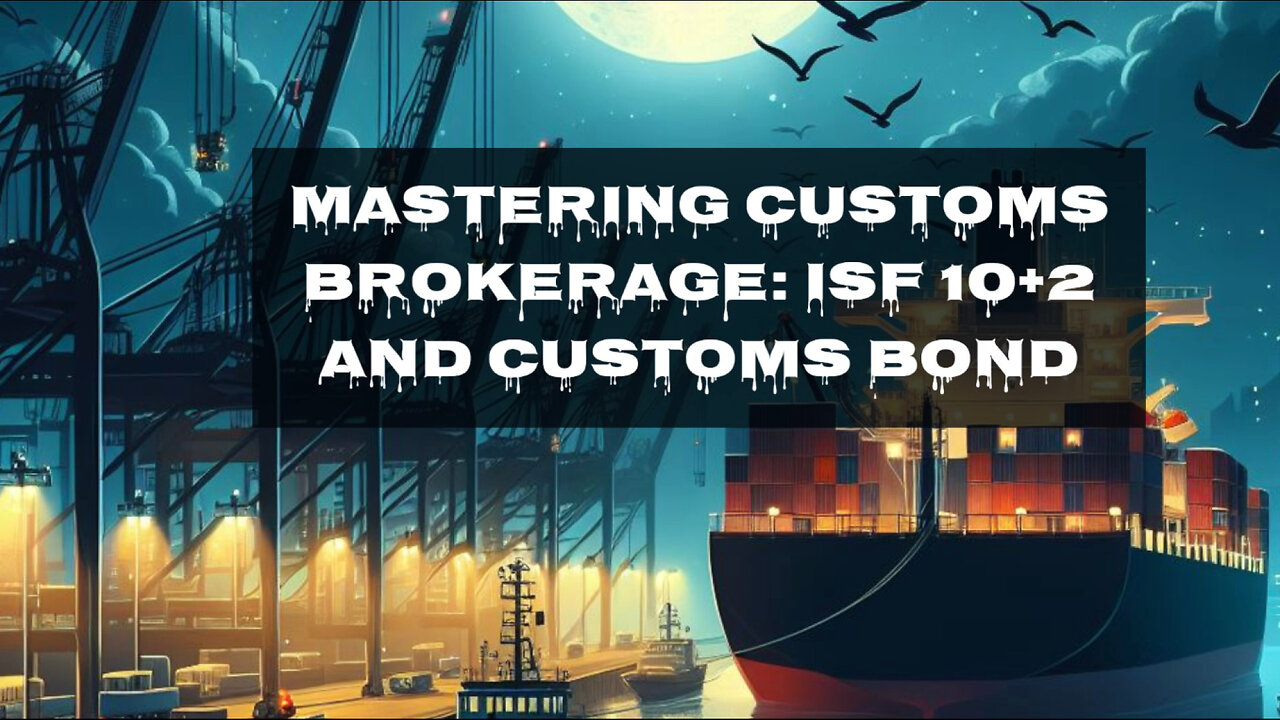Premium Only Content

Mastering Customs Compliance: ISF 10 2 and Customs Bond Explained
ISF Depot // 661-246-8217 // customs@isfdepot.com // www.isfdepot.com
In this video, we deep dive into the world of customs brokerage and discuss two important concepts: ISF 10+2 and the Customs Bond requirements. The Importer Security Filing (ISF), also known as 10+2, is a requirement by the US Customs and Border Protection (CBP) for importers to provide specific information about the cargo before it leaves the foreign port of export. This filing must be done 24 hours prior to the loading of the cargo onto the vessel. Customs Bonds, also known as surety bonds, are financial guarantees that ensure importers comply with CBP rules and regulations. They serve as insurance to protect the government and guarantee payment of duties, taxes, and fees related to international trade. There are two types of Customs Bonds: Single Entry Bonds and Continuous Bonds. Single Entry Bonds are used for one-time imports, while Continuous Bonds are valid for one year and cover multiple shipments. Having a Customs Bond offers benefits such as a smooth Customs clearance process, a level of trust with the CBP, and financial protection in case of violations or non-compliance. To obtain a Customs Bond, importers can work with a licensed surety company or a customs broker. The surety company will evaluate the application and set the bond premium based on factors like creditworthiness and the type of bond required. Once approved, the bond will be filed electronically with the CBP, and a bond number will be issued. This number needs to be included on shipping documentation for a smooth Customs clearance process.
#usimportbond #isfcustomsbroker #uscustomsclearing #isfentry
Video Disclaimer Here: This tutorial is independent and not affiliated with any US governmental entities.
-
 2:59:10
2:59:10
Wendy Bell Radio
15 hours agoThe Bridge Too Far
136K194 -
 1:03:45
1:03:45
Donald Trump Jr.
1 day agoHappy Festivus: Airing Our Grievances and Stopping The Swamp w/Sean Davis | TRIGGERED Ep.201
404K529 -
 1:30:30
1:30:30
Game On!
18 hours ago $7.48 earnedTop 5 things you need to know for Sports Christmas!
59.3K4 -
 1:58:10
1:58:10
Robert Gouveia
1 day agoMatt Gaetz REJECTS Report, Sues Committee; Luigi Fan Club Arrives; Biden Commutes; Festivus Waste
284K225 -
 1:31:40
1:31:40
Adam Does Movies
1 day ago $15.68 earnedThe Best & Worst Christmas Movies! - LIVE!
109K8 -
 58:10
58:10
Kimberly Guilfoyle
1 day agoAmerica is Back & The Future is Bright: A Year in Review | Ep. 183
198K75 -
 3:03:27
3:03:27
vivafrei
1 day agoEp. 242: Barnes is BACK AGAIN! Trump, Fani, J6, RFK, Chip Roy, USS Liberty AND MORE! Viva & Barnes
270K256 -
 2:05:48
2:05:48
2 MIKES LIVE
11 hours agoTHE MIKE SCHWARTZ SHOW with DR. MICHAEL J SCHWARTZ 12-24-2024
41.4K5 -
 1:14:17
1:14:17
MTNTOUGH Fitness Lab
1 day agoNavy SEAL Dom Raso: The Cold, Hard Truth About Modern Brotherhood | MTNPOD #96
31.7K4 -
 43:42
43:42
Dad Dojo Podcast
1 day ago $0.89 earnedEP14: Every Girl Dad's Biggest Fear and How To Prevent It
21.7K1